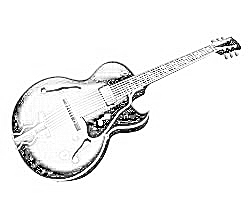
|
Desmond Paul Allen Guitar Music Instructor
|
Guitar & Music Lessons
$20 per 1/2 Hour at my studio
$30 per 1/2 Hour at your location
Beginner
Intermediate
Genres
Blues, Country, Folk, Pop, Rock-N-Roll,
I received my first guitar at age 14. It was an inexpensive, department store, classical, acoustic guitar. I do not remember the brand. I do remember that my vigorous and awkward strumming had broken all the strings within a week or so. But my determination to learn the guitar remained undaunted. I continued to practice the major and minor chord positions, and to strum against the string-less guitar thereby creating various percussion sounds. I even practiced finger picking techniques by systematically and rhythmically thumping my fingers against the guitar. By the time I got new strings several weeks later, I had these chords memorized, and my picking and strumming had improved immensely. Like most guitar players, I then learned a few simple songs and riffs. Slowly, over the next few years, my collection of chords, songs and riffs grew larger.
Unlike most guitar players, I also began to study music theory and chord construction. This knowledge has proved invaluable. I cannot overstate the importance for guitar players (as well as players of any musical instrument) to understand basic music theory. It is virtually impossible to make certain advancements without this knowledge. Of course, some musicians demonstrate a decided degree of creativity and musical sophistication without possessing a clear understanding of music theory; however, these relatively few musicians are the exception rather than the rule. After more than four decades of playing, studying, songwriting and teaching music on a casual basis to anyone willing to learn, I am more convinced than ever that every guitarist should learn scales, basic music theory, the theory of chord construction and basic keyboard. Even those relatively few naturally gifted musicians—those exceptions to this rule possessing an intuitive talent—can enhance their abilities with this knowledge.
Unfortunately, because beginners are generally very anxious to get on with playing songs, all too often they neglect to learn basic music theory or even proper guitar technique. This negligence ultimately inhibits their ability to play—at least correctly—the very songs they were so anxious play in the first place. It also inhibits their ability to play by ear, to jam with others, and to write their own songs. Thus, learning basic music theory, chord construction and proper technique must not be averted.
To better facilitate the learning of music theory and chord construction it is extremely important to have at least a basic understanding of the keyboard. I am not saying one must master the keyboard, but understanding its rudimentary construction makes understanding scales and chord structures easier and, thus, learning the guitar easier.
But the real hurdle to learning the guitar is not the learning of scales, chords, music theory, or even proper technique; the real hurdle is pain. Beginners will experience a decided swelling and burning pain in their fingertips for several weeks, until the requisite calluses form. There is no avoiding this pain, other than neglecting to practice, which eventually translates into abandoning the guitar altogether. Understandably, real-time practice will be limited during these initial weeks of pain; however, rather than abandoning the guitar as most would be guitar students eventually do, use this time to concentrate on the academic side: music theory, chord construction, scales and keyboard. The basics of these concepts can be learned even before your fingertips develop their toughness and you will be well on your way to being a guitar player.
I am prepared to provide lessons in basic and advanced guitar techniques, which include basic music theory, basic keyboard, chord construction, scales and finally, lessons in songwriting techniques. Because students are better motivated if they learn songs early in their musical education, several songs are interspersed throughout the various lessons.
The importance for guitar players (as well as players of any musical instrument) to understand basic music theory cannot be overstated. It is virtually impossible to make certain advancements without this knowledge. While some musicians demonstrate a decided degree of creativity and musical sophistication without possessing a clear understanding of music theory, they are the exception rather than the rule. After more than five decades of playing, studying, songwriting and teaching music, I am more convinced than ever that every guitarist should learn basic music theory, the theory of chord construction, scales and basic keyboard. Even those relatively few, naturally gifted musicians, who possess an intuitive talent can enhance their abilities with this knowledge.
Unfortunately, because beginners are generally very anxious to get on with playing songs, all too often they neglect to learn basic music theory, or even proper guitar technique. This negligence ultimately inhibits their ability to play—at least correctly—the very songs they are so anxious play in the first place. It also inhibits their ability to play by ear, to jam with others, and to write their own songs. Thus, learning basic music theory, chord construction and proper technique must not be averted.